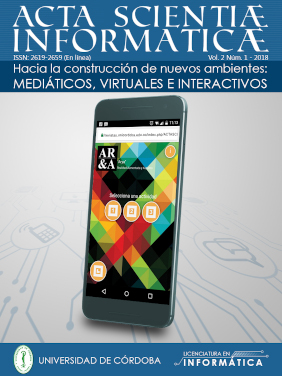NATURAL LANGUAGE FOR FACTOID-WH IN ENGLISH AS A FOREIGN LANGUAGE
NATURAL LANGUAGE FOR FACTOID-WH IN ENGLISH AS A FOREIGN LANGUAGE
Show authors biography
The purpose of this article is to describe the natural language made for the creation a Cognitive Model for Factoid-WH questions. A cognitive Model is a Representation of the cognitive processes that occur in the human mind. A Factoid-WH question is a question, which starts with WH-interrogated word and requires a fact as an answer. The methodology of this work is a cognitive modeling which consists of seven steps, three of them will be shown as the result of the analysis of the cognitive task in natural language for this model.
Article visits 585 | PDF visits
Downloads
O. Kolomiyets and M.-F. Moens, “A survey on question answering technology from an information retrieval perspective,” Inf. Sci. (Ny)., vol. 181, no. 24, pp. 5412–5434, 2011.
M. R. T. i Cherta, “Un estudio transversal de nivel de adquisición de la interrogación en inglés con alumnos de 8ode EGB,” Rev. española lingüistica Apl., no. 9, pp. 169–187, 1993.
K. McDonough and J. De Vleeschauwer, “prompt-type frequency, auditory pattern discrimination, and efl learnersproduction of wh-questions,” Stud. Second Lang. Acquis., vol. 34, no. 3, pp. 355–377, 2012.
V. Rus and C. G. Arthur, “The question generation shared task and evaluation challenge,” in The University of Memphis. National Science Foundation, 2009
C. Ramos, J. C. Augusto, and D. Shapiro, “Ambient intelligence the next step for artificial intelligence,” IEEE Intell. Syst., vol. 23, no. 2, pp. 15–18, 2008.
Y. Skalban, L. Specia, R. Mitkov, and others, “Automatic question generation in multimedia-based learning,” Proc. COLING 2012 Posters, pp. 1151–1160, 2012.
A. A. Gómez, M. F. Caro, A. M. Solano, and Y. M. Vega, “Trends of Educational Informatics in Latin America,” Int. J. Softw. Sci. Comput. Intell., vol. 10, no. 1, pp. 80–87, 2018.
A. A. Gómez and M. F. Caro, “Meta-Modeling Process of Pedagogical Strategies in Intelligent Tutoring Systems,” in 2018 IEEE 17th International Conference on Cognitive Informatics & Cognitive Computing (ICCI* CC), 2018, pp. 485–494.
A. J. Olier, A. A. Gómez, and M. F. Caro, “Cognitive Modeling Process in Metacognitive Architecture CARINA,” in 2018 IEEE 17th International Conference on Cognitive Informatics & Cognitive Computing (ICCI* CC), 2018, pp. 579–585.
V. Rus, B. Wyse, P. Piwek, M. Lintean, S. Stoyanchev, and C. Moldovan, “A detailed account of the first question generation shared task evaluation challenge,” Dialogue & Discourse, vol. 3, no. 2, pp. 177–204, 2012.


